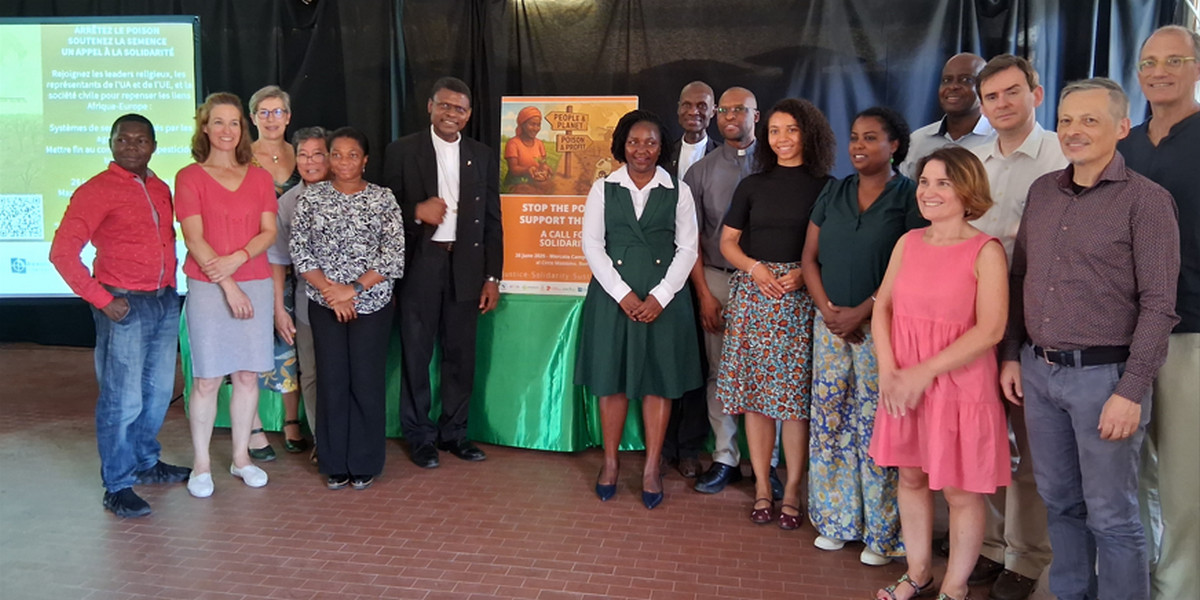Faith Leaders, Civil Society Organisations and Farmers Call for Justice in Africa–Europe Agricultural Relations
Joint press release

Brussels, 1st July 2025— At a powerful side event held on 26 June 2025, ahead of the 6th African Union – European Union Agriculture Ministerial Conference, African faith leaders, farmers, and civil society joined forces with European allies to demand urgent action on two critical fronts: protecting farmer-managed seed systems and halting the export of banned pesticides from Europe to Africa.
Hosted at the Circo Massimo Farmers’ Market in Rome, the event was co-organised by SECAM, AFSA, ESAFF together with its European civil society partners namely CIDSE, Misereor, DKA-Austria, Broederlijk Delen, CCFD-Terre Solidaire and Focsiv.
Participants issued a united call to the African Union, the European Union, and national governments: put an end to toxic trade practices and enshrine the rights of farmers to control their seeds and food systems.
“Seed are life,” declared Hakim Baliraine, Ugandan smallholder farmer and Chair of the Alliance for Food Sovereignty in Africa. “When we lose seeds, we lose options. We lose sovereignty. We become destitute.”
Participants warned that UPOV-style seed laws promoted across Africa, often with donor support, threaten to criminalise the saving, exchange, and improvement of traditional seeds — the very foundation of African food systems.
Hon. Françoise Uwumukiza, Chair of the East African Legislative Assembly’s Agriculture, Tourism and Natural Resources Committee, affirmed a shift in political will:
“This is not a debate between modernity and tradition. It’s about dignity, resilience, and justice. We want seed laws that protect farmers, most of whom are women, not punish them.”
The second panel exposed the hypocrisy of the European Union, where highly hazardous pesticides banned for health and environmental reasons are still produced and exported to Africa and the rest of the world.
“Europe is exporting poison that it doesn’t want to use on its own fields. But Europe imports food grown with it, so the residues end up on European consumers’ plates” said Suzy Serneels of Broederlijk Delen. “This is a double standard that must end.”
According to PELUM Association, pesticide use has doubled across Africa over the past 15 years — often without farmer being trained or having access to protective equipment. Scientific studies have revealed banned pesticide residues in food, drinking water, and even human urine samples.
“These toxins are in our food, water, and bodies”, said Medius Bihunirwa of PELUM Association. “And the most vulnerable — are women and children — who suffer most.”
Faith leaders condemned these practices as immoral and incompatible with the values of justice and stewardship.
“If these pesticides are too dangerous for Europeans, they are too dangerous for Africans,” said Rev. Fr. Richard Rwiza, Professor at the East African Catholic University. “Our governments have a sacred duty to protect life — not to sell it off to chemical companies.”
The event concluded with a clear set of policy demands:
To the European Union and Member States:
- Immediately ban the export of all pesticides prohibited within the EU.
- Ensure EU food imports are not produced with substances banned in Europe.
- Support agroecological transitions in Africa with public finance and just trade policies.
To the African Union and Member States:
- Finalise and implement the continental policy framework on farmer-managed seed systems.
- Reform restrictive seed laws to recognise and support traditional seed saving, exchange, and improvement.
- Ban the import and use of highly hazardous pesticides by implementing the Bamako Convention.
- Invest in agroecological alternatives, farmer-led research, and community seed banks.
Bishop Toha’s closing message reminded all present:
“Seeds and pesticides are not just technical issues — they are about justice, sovereignty, and life itself. May our children eat without fear.”
As the AU and EU deliberate behind closed doors, farmers, faith leaders, and civil society are making one thing clear: Africa deserves food systems rooted in dignity — not dependency and toxicity.
ADDITIONAL RESOURCES:
- “Protecting the seeds of life: Our duty to defend African farmers“, news article by Francesca Merlo on Vatican News with an interview from Manny Yap, Food and Land Officer at CIDSE.
- “Stop the Poison, Support the Seed: a call for solidarity“, recording of side-event organised ahead of the 6th African Union – European Union Agriculture Ministerial Conference, 26 June 2025.
CONTACTS:
CIDSE: Jose Emmanuel Yap, Food and Land Officer (yap(at)cidse.org)
SECAM: Fr Uchechukwu Obodoechina, Director of JPDC-SECAM: secamjpdcdirector(at)gmail.com
Cover photo: AU-AU agriculture ministerial conference parallel side event participants, Rome, 26 June 2025. Credit: Focsiv.

